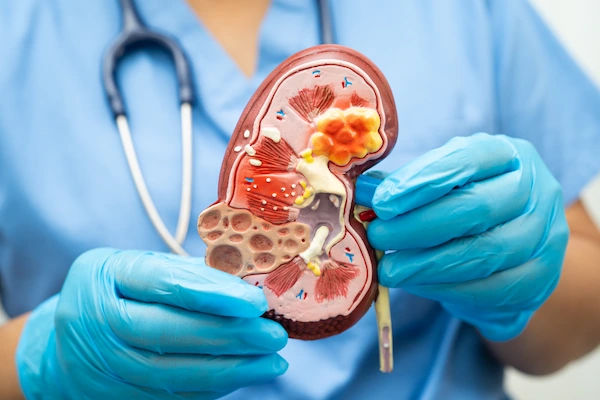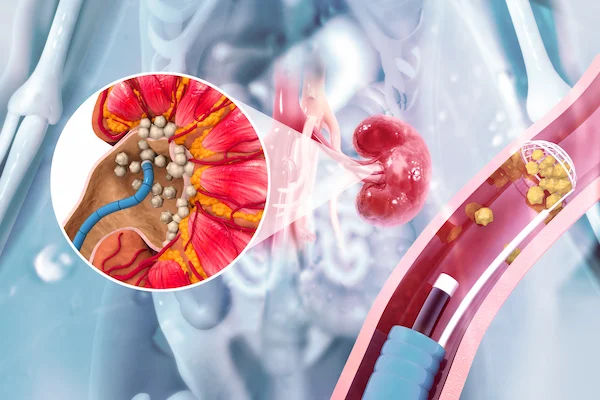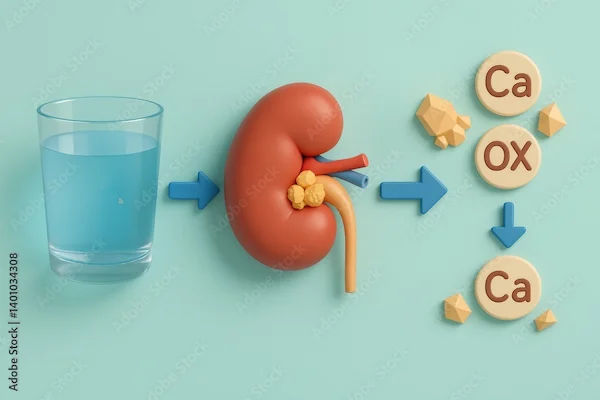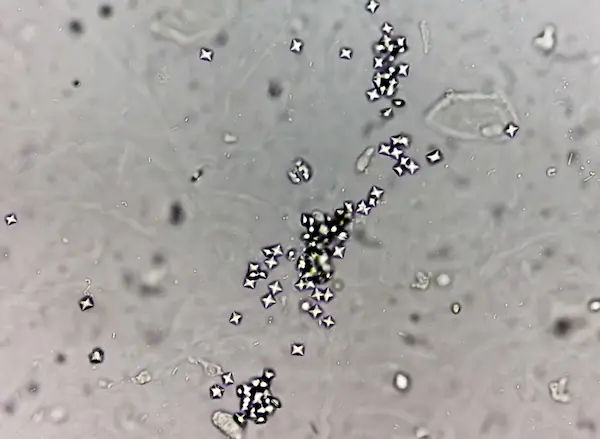Guide to Key Facts About Urinary Stones
Learn the essential facts about urinary stones, including causes, symptoms, diagnosis, treatment options, and prevention strategies.

Written by Dr. M L Ezhilarasan
Reviewed by Dr. Rohinipriyanka Pondugula MBBS
Last updated on 13th Jan, 2026

Introduction
Few things in life compare to the excruciating pain of a urinary stone. Often described as "worse than childbirth," this common condition sends over half a million people to emergency rooms each year. But beyond the infamous pain, how much do you really know about these tiny, crystalline formations? Urinary stones, also known as kidney stones or nephrolithiasis, are hard deposits of minerals and salts that form inside your kidneys. They can be as small as a grain of sand or as large as a pearl, and their journey through your delicate urinary tract is what causes the unforgettable agony. This guide will walk you through the essential facts about urinary stones—from why they form and how to spot the symptoms, to the latest treatment options and proven prevention strategies. Understanding these facts is your first step toward managing your risk and finding relief.
What Exactly Are Urinary Stones?
Urinary stones are solid masses that crystallise from dissolved minerals in your urine. Think of your urine as a solution that can hold a certain amount of these minerals. When the urine becomes too concentrated, or when the balance of substances that normally prevent crystallisation is off, these minerals can begin to stick together and form a stone.
How Do Stones Form in the Urinary Tract?
The process typically starts in the kidney. When your body isn't adequately hydrated, your urine volume decreases, making it more concentrated with waste products like calcium, oxalate, and uric acid. If the concentration gets high enough, these substances have a greater chance of coming out of solution and forming crystals. These crystals can then attract other elements and grow into a solid stone. Some stones stay in the kidney for years without causing any issue. The problems begin when a stone breaks loose and travels down the ureter—the narrow tube connecting the kidney to the bladder. This passage can block the flow of urine, causing pressure and intense pain.
Consult a Urologist for the best advice
The Four Main Types of Urinary Stones
Not all stones are created equal. Knowing the type of stone you have is crucial for effective treatment and prevention, as the dietary advice can be contradictory depending on the composition.
Calcium Stones (Oxalate and Phosphate)
This is the most common category, accounting for about 80% of all stones. They are primarily made of calcium oxalate, though some are calcium phosphate. High oxalate levels in urine are a major risk factor. Oxalate is a natural substance found in many foods, like spinach, nuts, and chocolate. Your liver also produces it.
Struvite Stones
These stones form in response to an infection, such as a urinary tract infection (UTI). They can grow very large very quickly, sometimes forming a "staghorn" shape that fills the entire kidney. They are more common in women, who have a higher incidence of UTIs.
Uric Acid Stones
These form when urine is persistently too acidic. People who eat a high-protein diet (rich in purines from red meat and shellfish), those with gout, or those who lose fluids rapidly (e.g., chronic diarrhoea) are more susceptible to uric acid stones.
Cystine Stones
These are the rarest type and are caused by a hereditary disorder called cystinuria. This condition causes the kidneys to excrete excessive amounts of the amino acid cystine, which is poorly soluble in urine and readily forms stones.
Recognising the Symptoms: It's More Than Just Pain
While severe pain is the hallmark, urinary stones can present with a variety of symptoms. Some very small stones may pass without any symptoms at all.
The Classic Signs of a Kidney Stone
- Severe Pain: This is often called renal colic. It's a sharp, cramping pain in the back, side, lower abdomen, or groin that comes in waves as the ureter tries to squeeze the stone out. The pain often shifts location as the stone moves.
- Painful Urination: A burning sensation when you urinate.
- Hematuria: Pink, red, or brown urine caused by blood. This can be visible to the naked eye or only detectable under a microscope.
- Urgency and Frequency: A constant need to urinate, often only passing small amounts.
Nausea and Vomiting: The intense pain can trigger a visceral response, leading to nausea.
When to Seek Immediate Medical Help
If your pain is unbearable and accompanied by fever and chills, it could indicate a serious infection secondary to a blockage. This is a medical emergency. Similarly, if you are unable to keep fluids down due to vomiting or cannot urinate, you must seek care immediately. If you experience these severe symptoms, consult a doctor online with Apollo24|7 for immediate guidance or to book an urgent physical visit.
Who is at Risk? Understanding the Key Factors
Several factors can increase your likelihood of developing stones.
Dietary and Lifestyle Risk Factors
- Dehydration: Not drinking enough water is the single biggest risk factor.
- High-Oxalate Diet: Excessive consumption of spinach, rhubarb, nuts, beetroot, and potato chips.
- High-Sodium Diet: A salty diet increases the amount of calcium your kidneys must filter.
- High-Protein Diet: Diets rich in animal protein create a more acidic environment in the urine, promoting uric acid and calcium stones.
- Obesity: High body mass index (BMI) is linked to an increased risk of stones.
Medical and Genetic Risk Factors
- Personal or Family History: If you or a family member has had a stone, you're more likely to develop one.
- Certain Diseases: Conditions like renal tubular acidosis, cystinuria, hyperparathyroidism, and recurrent UTIs increase risk.
- Digestive Diseases: Inflammatory bowel disease or chronic diarrhoea can affect your absorption of water and minerals, increasing stone-forming substances in your urine.
- Certain Supplements: Excessive vitamin C and calcium supplements can contribute.
How Are Kidney Stones Diagnosed?
If a stone is suspected, doctors use several methods to confirm its presence, location, and size.
Common Imaging Tests (CT Scan, Ultrasound, X-ray)
- Non-contrast CT Scan: This is the gold standard. It's fast, accurate, and can detect nearly all types of stones.
- Ultrasound: A safer, radiation-free option often used for pregnant women and children. It's good at detecting blockages and larger stones but can miss smaller ones.
- X-ray (KUB): Useful for tracking known calcium-based stones but misses many other types.
Urine and Blood Analysis
24-Hour Urine Collection: This is the most important test for preventing future stones. It analyses the volume, pH, and levels of stone-forming minerals in your urine over a full day.
Blood Tests: Can check for high levels of calcium or uric acid, and assess how well your kidneys are functioning. Apollo24|7 offers convenient home collection for these crucial tests, making the diagnostic process easier.
Treatment Options: From Waiting to Surgery
The right treatment depends entirely on the stone's size, location, and composition, as well as your pain level.
Conservative Management (Watchful Waiting)
Small stones (typically less than 5mm) often pass on their own. Doctors will advise drinking a lot of water (2-3 quarts a day) to help flush it out and prescribe pain medication.
Medical Expulsive Therapy (MET)
For stones in the ureter, doctors may prescribe an alpha-blocker medication. This relaxes the muscles in the ureter, making it easier for the stone to pass and reducing pain.
Shock Wave Lithotripsy (SWL)
This is a non-invasive procedure that uses high-energy sound waves to break the stone into tiny fragments that can then be passed in your urine. It's best for small to medium-sized stones in the kidney or upper ureter.
Ureteroscopy and Laser Lithotripsy
A thin scope is passed through the urethra and bladder into the ureter. Once the surgeon sees the stone, a laser fiber is used to break it into dust. The fragments are then removed. This is highly effective for stones in the lower ureter.
Percutaneous Nephrolithotomy (PCNL)
This surgery is reserved for very large stones. A small incision is made in your back, and a tunnel is created directly into the kidney. A nephroscope is used to find and remove the stone. It requires a hospital stay.
Preventing Future Stones: Your Long-Term Strategy
If you've had one stone, you have about a 50% chance of forming another within 10 years. Prevention is key.
The #1 Rule: Hydration, Hydration, Hydration
Aim for 2.5 to 3 liters of fluid per day, mostly water. This dilutes your urine, making it harder for stones to form. Your urine should be light yellow or clear.
Tailoring Your Diet to Your Stone Type
- Calcium Oxalate Stones: Reduce oxalate-rich foods. Don't cut calcium from your diet, as this can actually increase stone risk; instead, consume calcium with meals to bind oxalate in the gut.
- Uric Acid Stones: Limit animal protein (red meat, organ meats, shellfish). Your doctor may advise medications to reduce urine acidity.
General Advice: Reduce sodium intake, eat more fruits and vegetables (which make urine less acidic), and maintain a healthy weight.
Conclusion
Understanding the facts about urinary stones empowers you to take control of your urinary health. While the experience can be incredibly painful, modern medicine offers a wide range of effective treatments to provide relief and remove stones. More importantly, by focusing on prevention—primarily through consistent, ample hydration and targeted dietary adjustments—you can significantly reduce your risk of a recurrence. Listen to your body, don't ignore symptoms, and work closely with a healthcare provider to develop a personalised plan. If you have a history of stones or are experiencing concerning symptoms, booking a consultation with a urologist on Apollo24|7 can provide you with the expert guidance needed for diagnosis, treatment, and long-term prevention strategies.
Consult a Urologist for the best advice
Consult a Urologist for the best advice
Dr. Mohamad Ali
Urologist
1 Years • MBBS, MS General Surgery, M Ch Urology
Pune
Apollo Hospitals Pune, Pune

Dr. Shashikant Gupta
Urologist
13 Years • MS (General Surgery),MCh (Urology & Renal Transplant)
Lucknow
Apollomedics Super Speciality Hospital, Lucknow
(50+ Patients)

Dr. Pravin Jayram Govardhane
Urologist
10 Years • MBBS, MS, DNB (Genito Urinary Surg.)
Nashik
Apollo Hospitals Nashik, Nashik

Dr. Chandan Phukan
Urologist
10 Years • MBBS, MS (Surgery), Mch (Uro), FRCS (Uro)
Guwahati
Apollo Excelcare Hospital, Guwahati

Dr. N Naidu Chitikela
Urologist
7 Years • MS, MCh
Chinagadila
Apollo Hospitals Health City Unit, Chinagadila
(100+ Patients)
Consult a Urologist for the best advice
Dr. Mohamad Ali
Urologist
1 Years • MBBS, MS General Surgery, M Ch Urology
Pune
Apollo Hospitals Pune, Pune

Dr. Shashikant Gupta
Urologist
13 Years • MS (General Surgery),MCh (Urology & Renal Transplant)
Lucknow
Apollomedics Super Speciality Hospital, Lucknow
(50+ Patients)

Dr. Pravin Jayram Govardhane
Urologist
10 Years • MBBS, MS, DNB (Genito Urinary Surg.)
Nashik
Apollo Hospitals Nashik, Nashik

Dr. Chandan Phukan
Urologist
10 Years • MBBS, MS (Surgery), Mch (Uro), FRCS (Uro)
Guwahati
Apollo Excelcare Hospital, Guwahati

Dr. N Naidu Chitikela
Urologist
7 Years • MS, MCh
Chinagadila
Apollo Hospitals Health City Unit, Chinagadila
(100+ Patients)
More articles from Urinary Tract Stone
Frequently Asked Questions
What is the fastest way to dissolve a kidney stone?
The dissolution depends on the stone type. Uric acid stones can sometimes be dissolved over time with medications that alkalize the urine (like potassium citrate). Other stone types, like calcium oxalate, cannot be dissolved and must be passed or broken up.
Can drinking soda cause kidney stones?
Certain sodas, particularly those high in phosphoric acid (like colas), are associated with a higher risk of stone formation due to their acidifying effect on urine. It's best to limit soda and focus on water.
What are the first signs of passing a kidney stone?
The first sign is often a sudden, severe pain in your back or side below the ribs. This may be accompanied by a change in urine color (pink, red, brown) and a persistent need to urinate.
How long does it take to pass a kidney stone?
This varies widely. A small stone (less than 4mm) may pass in a week or two. Larger stones can take much longer and may not pass on their own, requiring medical intervention.
Are kidney stones more common in men or women?
Historically, men have been more affected, but recent studies show the gap is narrowing, likely due to dietary and lifestyle changes. Men still have a slightly higher incidence.

.webp)


